#Horde Prime origin story
Explore tagged Tumblr posts
Text
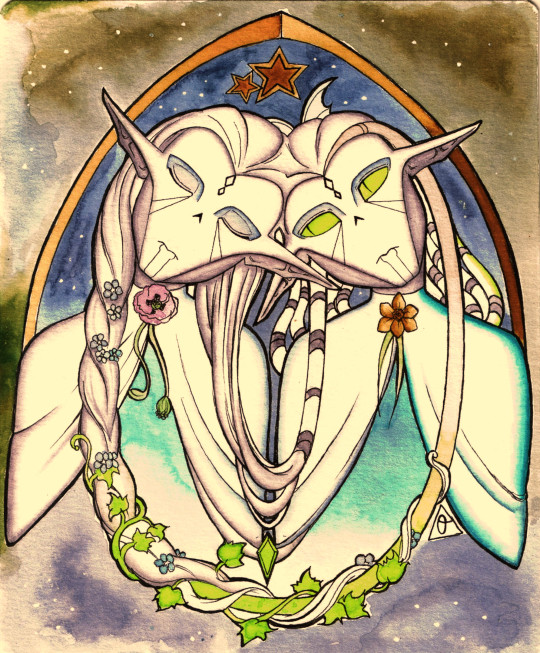
For @cirusthecitrus - The Kur Twins, Anillis and Hec-Tor, from Violent Youth
A Dream, a Mirror, and a Symphony ♪♫
I love your boys to bits, thank you for letting me draw them - irl could not prevent me from finishing this piece ♪▲ :3
Inspired by this artwork:
#The Kur Twins#Cirusthecitrus#Horde Prime#Horde Prime Origin Story#Spacebats#Galactic Horde Origins#She-Ra and the Princesses of Power
49 notes
·
View notes
Text
Okay, so: the premise of the Final Fantasy VII remake is that the audience's demand for the remake to follow exactly the same plot as the original has manifested as a horde of evil ghosts who intervene in order to keep the story on the expected rails, with a particular emphasis on ensuring that characters in the remake die at the same times and under the same circumstances as their original counterparts. At the end of the remake's first instalment, Cloud and friends fight and defeat the king of the Evil Plot Ghosts, an act which breaks time and creates a multiverse where everybody's fanfic is real. Sephiroth subsequently merges with all the fanfic versions of himself and becomes some sort of fucked up metanarrative god. Later, Cloud simultaneously succeeds and fails in preventing Aerith's death, which partially dislocates him from the prime narrative reality, and he begins perceiving an adjacent universe where Zack never died. The Aerith of that universe then teams up with Cloud to fight Hyperdimensional Meta Bullshit Sephiroth, a battle that ends inconclusively when Sephiroth flees, stranding Zack-lives-universe Aerith in the prime narrative reality, though only Cloud can see her. The game closes with the revelation that, unbeknownst to everyone else, Sephiroth slipped the Black Materia into Cloud's pocket during their fight, setting in motion the events of the unpublished third instalment. Have I got all that straight?
#gaming#video games#final fantasy vii remake#final fantasy vii rebirth#final fantasy vii#final fantasy#metatextual wankery#violence mention#death mention#swearing#final fantasy vii remake spoilers#final fantasy vii rebirth spoilers#final fantasy vii spoilers#final fantasy spoilers#spoilers
3K notes
·
View notes
Text
You have me curious, I am bookmarking this fic for my next rest day!!! Sharing because my Emperor deserves more stories about Him. ♪▲ And because finding the existence of this fanfic comes as a blessing to be honest, like a present from the skies :3
The artwork is beautiful. I love how they have their backs turned to each other, and both flowers and stars in their hair. The planetary system earring with the Horde Diamond symbol on Anillis' ear is magnificent (it also looks like the chips He will use on Etheria, my curiosity is raising high). I love the contrast about how Anillis has stars in his hair, when Hec-Tor has flowers, and I am wondering, - does this have something to do with their stories? And also, is this a daffodil I see in Anillis' hair, the big flower? And is the one in Hec-Tor's hair a poppy? This speaks to my mythology lover and symbolism lover's heart I am sorry if I ask or talk too much, I'll go read asap! (Also about the flowers, I would have a question, what are the little ones in Hec-Tor's hair? I will go read so I may have my answers, and if not, it is a bonkers amazing piece of art) And next time i'll post something relevant x)
Childhood of Horde Prime

This work is an introduction to the Kur Twins AU (which main story will be told in the form of a comic)
Kur Twins AU is my vision of Horde Prime's origin story. Some ideas that get explored in the AU:
Horde Prime starts out as a "normal" mortal person, he's not even a royalty
Prime (Anillis Kur at the time) had an identical twin (Hec-Tor Kur)
Young Prime suffers from the same "defect" as Hordak
He and Hec-Tor were mistaken for two local deities by the religious community
Krytis is Prime's homeplanet
--------------------------------------- Well, so much for me thinking that giving Prime an angsty childhood is cringe and boring
This thing is long af, but I still hope you’ll enjoy :}
#Horde Prime#fanfiction#She-Ra 2018#Cirus the Citrus#Horded Prime Origin Story#Yes yes yes more Horde Prime lore and origin stories yesssss
82 notes
·
View notes
Note
What do you think about people comparing catra to Caitlyn from arcane
ah, i had a feeling i'd be asked about something along these lines.
okay, so, just to get this out of the way:
i'm aware that Arcane s2 has very polarizing opinions, points of views, and thoughts from the community, and, provided it's nothing extreme, they're all valid. though my words are largely subjective, i want to apply as much objectivity as possible to create a better picture, rather than complete bias with no desire for discussion.
s2, in my opinion, wasn't as well-written as it could've been. i don't hate it, but i would've made different writing choices for the characters, their arcs, etc., and i feel the ending was lackluster as a result of lack of closure. this includes Jinx's own ending, Isha, Vi's cycle of self-destruct and complicated family, and how i feel there was not enough screentime for the plots and characters given, especially Ekko, Mel, Kino, and Ambessa. and i do feel like the writing choices negatively affected Caitlyn's character, as well, even if i do understand and sympathize with her as a person.
objectively speaking, Caitlyn's dictatorship ( i believe that's what it is, iirc ) was more on-screen than Catra's, but Catra's crimes was heavier, quantity wise, including universal genocide.
because of SPOP's disregard for "show, don't tell", amongst several other factors ( Catra being a creator's pet being the main one ), there is little to no actual weight to her actions, even with the main cast. if there is consequences, it's either more personal than it should be, her mental breakdowns or Horde Prime chipping her, or fleeting, the destruction of Salineas. this is likely why people don't care much for Catra's actions, because there's no legitimate consequences that aren't just her being sad // distressed.
but, while not the best, Arcane writers take into consideration the impact of and to the people. Caitlyn's decisions did have consequences, and it affected more than just her. it changed Zaun, and with Silco and Jinx's absence, the people were anxious and needing a beacon in order to feel safe and empowered.
however, i don't think it's as simple as comparing Caitlyn to Catra.
in the eyes of the people, it wouldn't matter, obviously. as a result of taking her grief and thirst for vengeance out on them, the people of Zaun felt even more unsafe when they were already suffering.
but to us, as the audience, we can empathize with grief blinding us and leading us to making poor decisions that end up being detrimental to our and everyone else's health. keyword: empathize.
Caitlyn still hurt people. there is no denying that. i am simply saying that we can understand where she was coming from and that her grief was taken advantage of by Ambessa.
to their world, it's black and white. people suffer and // or die at the hands of someone in power.
to us, it's more or less than that.
still wanting to remain as objective i can be, i will say Caitlyn's are far easier to remember and hold against her, and rightfully so. but i believe that Catra's are worse and should've been displayed as worse, rather than stated or turned around to be a way for us to feel bad for her own downfalls.
now, let's move onto Caitlyn and Vi // Catra and Adora.
like with the season, i prefer s1 CaitVi over s2.
for me, the divide and conflict felt too similar to how their relationship originally started out and was too repetitive. it felt like the writers wanted another reason for them to break apart, when there was a lot of time spent to them forming together.
but i think CaitVi has more room to grow than C // A ever really did.
for one, Caitlyn and Vi have cared for each other more than they've hurt each other. even when they were at odds in s1, there was no point in the story where they left one or the other to die. if something bad happened, it was by circumstance, not by choice.
but Catra had always hurt Adora more than she cared for her. from physically harming her to degrading her, engaging in extreme sadism, and nearly killing her, purposefully, on multiple occasions, there's no actual evidence that Catra deeply cares for Adora, or that she cared to begin with.
for another, Caitlyn had more reason than Catra. Catra was given multiple chances to make better choices, but she never did and it was intentional and out of spite.
what was Caitlyn going to do with the fact her mother was killed, that her girlfriend's sister was the murderer, and that her girlfriend stopped her from doing from killing the culprit because she thought she'd kill a kid instead?
of course, it was highly likely that she would've killed Isha. again, blinded by grief. but Caitlyn didn't think that way. in her mind, she has more evidence of being an excellent shot than not, so, obviously, the possibility of her killing the child was 0, right?
( and i don't think Caitlyn cheated on Vi with Maddie. i read the end of their argument as a break-up, especially because Vi disappeared. )
and, for one last thing, even when she knew Vi didn't trust her and kept fighting with her, Caitlyn still tried to help.
overall, i think CaitVi did have a... meh(?) ending, but i still prefer them over C // A. if nothing else, for the foundation.
i don't think Caitlyn and Catra are the same. i just think the Arcane writers had more respect for their audience than SPOP did.
#spop#she ra#spop critical#spop salt#spop criticism#spop discourse#spop adora#she ra adora#adora#adora deserves better#adora deserved better#spop catra#she ra catra#catra#anti catra#anticatra#anti catradora#anticatradora#arcane critical#arcane salt#arcane criticism#arcane discourse#arcane caitlyn#arcane vi#caitlyn kiramman#violet arcane#caitvi#caitlyn x vi
36 notes
·
View notes
Note
how do you feel about the whole "you always wanted more" line that got cut? at first i was wondering why they did that because adora didn't want more until it made me think "huh, what if prime was just running on catra's memories and didn't actually know adora?" but i'm curious as to what you think

OH MY GOD I AM SO GLAD YOU ASKED THIS. i am such a sucker for the cut STC script. back in late 2020 & early 2021 i had a twitter layout based on “that little spot on the roof that only they knew about” because S3 is my favorite:
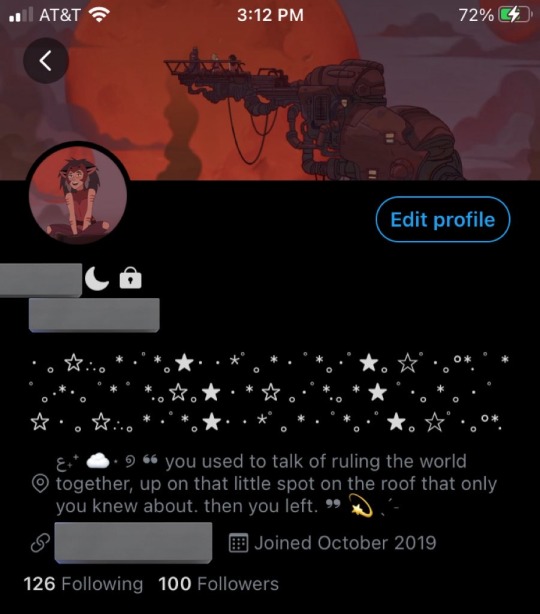

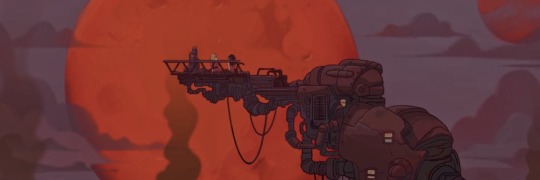
even better, i have another old twitter fancam saved from around that time too that used that screenshot of the script in the beginning. it was by the username yoosene but is now long gone, so i reuploaded it to imgur here (the hands part, i’m going insane…)!
anyway, as for interpretations, it was absolutely to manipulate & guilt-trip adora. i recently saw someone say (i don’t remember where though, sorry) that he was torturing both of them by setting up that nasty fight against both of their wills and had planned to kill catra all along — despite saying he wouldn’t right after she rescued glimmer and was imprisoned for it, in my opinion there was an unspoken “yet” even though he did technically say that word but you know what i mean; “you will be of use to me, and then everyone from your blighted planet, including yourself, will be destroyed.”

that’s the thing about what the show was trying to convey through her stay on prime’s ship via glimmer’s desperate pleas, isn’t it? her illusion of power was only ever temporary. once she no longer had anything of value to serve, what would she be worth? how could she have genuinely believed that he wanted to save her, of all living beings, from the curse of humanity & will of consciousness? what makes one individual different to an omnipotent god compared to countless others across the universe throughout space and time? i truly believe that he was subtly mocking her when he talked of her being “exalted, raised up above the other wretched creatures of [her] home world.”

i was actually trying to find another five by five takes quote about this, because mentioning them is always an obligation for me, but surprisingly i didn't really find anything about how catra had worked her way up to prime's recognized single subordinate (only that moment of reflection afterward, which is just this entire short video), and was under the false impression with a cocky & confident attitude that her position meant something for her safety & survival; i'm mostly referring to this moment:
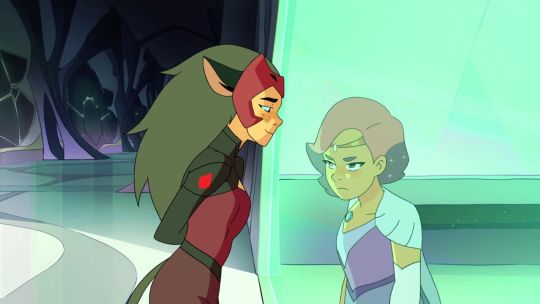
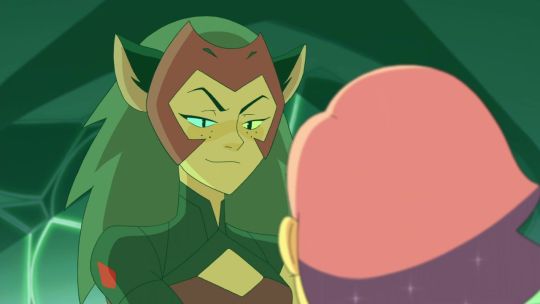
the horde's the horde...even in space. as long as i'm of value to horde prime, i've got a place in this world. i can work my way up here, just like i did before.
actually y’know what… i’m going to tag @horde-princess because this is starting to dive into religious meta which is like… her whole gimmick thingy. we would be blessed (pun intended) to see your take on this writing that never made it to the show, if you haven’t given it already!
now this is veering too far off from the original point after getting sidetracked. the tone of those quotes in the alternate script is (fake) pity, and horde prime was entertained by the struggles of mere mortals. to make adora a failure of what she represented would surely force her to give up she-ra to him, because what would even be the point anymore of living up to expectations if she couldn’t save catra first & foremost (that’s something that she struggled with since initially leaving the horde over three years ago due to how catra made her feel about supposedly breaking their childhood promise… but it’s a story for another post)?
i don’t doubt that your thought process is at least partially right too though, anon. prime didn’t read adora’s mind thoroughly at any point, so it’s entirely possible that he just read off catra’s intense feelings of abandonment & betrayal. that being said, if he really did see all as he claimed, maybe he was able to recreate an objectively accurate collection of events and knows what really happened and what the intentions behind certain actions were. i also wonder if catra secretly knew deep down that adora’s defection wasn’t directly about her but just couldn’t admit it until she had time to deeply reflect on it during “corridors.”
i’ll leave this messy, unorganized post with an amazingly relevant gif set made by an editor whose work on here i really enjoy:




as i said a long time ago, you just had to be there on november 19th 2020 when that excerpt was released because the hype was crazy!
#asks#anon#spop#she ra#she-ra#she-ra and the princesses of power#catradora#catra#adora#glitra#glimmer#analysis#s5#season five#5x05#stc#save the cat#five by five takes#video edit
35 notes
·
View notes
Text
ok people here's my essay. (also note that this was for my english class so it is written in a different style than i usually would. it had to be all formal and grammatically correct and such)
2212 words, analytical essay
She-Ra and the Princesses of Power: A Queer Allegory for Religious Trauma
ND Stevenson’s She-Ra and The Princesses of Power is an animated Netflix original series rebooting the classic 80s show Shera: Princess of Power. This time, however, the show is chalk-full of diversity, varied body types, queer representation, pleasing colour palettes, and a friends-to-enemies-to-lovers lesbian romance. The first four seasons follow Adora (aka She-Ra) and the princesses of Etheria’s fight against the Evil Horde, using their magic to try bringing peace and justice to the planet. A portal is opened at the end of the fourth season, however, bringing the planet of Etheria out of the isolated dimension of Despondos. No longer separated from the rest of the universe, Horde Prime arrives at Etheria- not only bringing higher stakes than any season preceding it, but an entirely new layer of symbolism to the series. The final season was a clear allegory for religious trauma, an especially relevant topic for the show’s majorly queer audience.
When his armada arrives at Etheria, Horde Prime sends his army of clones and robots down to take the planet by force. Unlike the Evil Horde that had been trying to take the planet before Prime’s arrival, who were disorganized, messy, and industrial, everything under Prime is sleek, elegant, efficient, and most importantly: white. Horde Prime’s ships are white, Horde Prime’s robots are white. Horde Prime’s skin is white, his hair is white, his clothes are white, as are all his clones. Pure, unblemished white, with only sparing accents of grey or green.
In colour theory, white has a few meanings. The colour can represent purity, cleanliness, innocence, and even righteousness. This colour theory is heavily incorporated into biblical verses, metaphors, and artwork (and some might even argue that our modern idea of white comes from the Bible). In art, God and angels are almost always depicted wearing white, as is Jesus in his resurrection. Halos of white or light yellow are shown adorning holy figures' heads. Several bible verses use white robes or other white objects as a metaphor of the wearer’s purity. White is still used in several Christian rituals/customs today, such as weddings, baptisms, and more. White is one of (if not the) most important colour in Christian lore. Even in instances where pure white isn’t used, there is a clear correlation between light versus dark and good versus evil.
White has more than one meaning, however- on the opposite side of the coin, white can also represent coldness, blankness, emptiness, and loneliness. The most interesting thing about the show’s use of white is that it encapsulates both facets of its representation. Horde Prime uses white to represent his purity and perfection, but to the people of the colourful, messy world Etheria, this is a cold, eerie colour. As are Horde Prime’s ideals. His perfection and purity is synonymous to coldness. The white represents both- not only simultaneously, but as the same thing.
Horde Prime’s empire being entirely white is no coincidence- neither in-story by Prime, nor in real life by the writers. Horde prime uses white to represent everything he stands for, and the writers use white to represent everything Christianity stands for.
Horde Prime is a being that has lived an amount of lifetimes beyond comprehension- every time his body starts to grow old and fail, he selects a new clone of his to insert his memory and very essence into. So even though he has a new body, he is still him. And the reason for this? To fulfill his self imposed purpose of bringing peace and perfection to the universe. To thousands of planets he has been, one at a time, to reach this. Horde Prime believes there is only one right way to do things, and that humanity cannot be trusted to govern themselves.
Every planet he takes goes the same: he arrives with his ships, and slowly implants chips into the neck of each and every being on a planet. These chips take away the autonomy of the host, and they are left blank. No personality, no choices, no person. All their actions are perfectly automated and controlled by a hive mind, and Horde Prime can take specific control of and see through the eyes of any individual at any given time. With Horde Prime in control, there is no war, no famine, no pain. There is only peace, perfection, and purity. And anyone who does not conform, does not accept his gracious rule, are dealt with accordingly. Entire planets have been left desolate and barren, entire peoples subjected to genocide for not accepting Horde Prime. All dead in the name of peace.
These ideals upheld by Horde Prime are strikingly similar to Christianity. Perfection and purity are two of the main ideals of Christianity, in hand with righteousness. Christians strive to “be like Jesus,” to be their idea of a good person, to be loyal to their religion, and to make it into Heaven. Several rituals to “repent” exist when they feel they have not upheld these standards correctly- including prayer, confessionals, sacrament, and baptism. Even though true perfection, purity, and righteousness are typically seen as unattainable to everyone but the Godhead, it is common belief that constant trying will at least get you as close to it as possible. Conformity is another key aspect of Christianity, though it is not advertised, and to the exact extent it is upheld depends on the sect. In general, though, Christianity pressures every one of its followers (and even those who aren’t) to behave a certain way, to think a certain way, and to only associate with others among themselves.
Horde Prime’s way of upholding these ideals isn’t dissimilar to Christianity’s either. Much like Horde Prime’s Galactic Empire, Christianity has had a long history of forced assimilation. From the Spanish conquistadors to the pilgrims and other colonial settlers of North America, death and pain has come in the wake of the spread of Christianity for hundreds of years, amongst various sects of the religion. Native peoples have been murdered for their loyalty to their “savage” non-Christian ways, land has been stolen, and indigenous religions and other important cultural traditions have been changed past recognition or completely erased, all in the name of “saving,” all in the name of “love,” all in the name of “what’s right,” all in the name of God. Christianity is the only right way, Horde Prime is the only right way.
Its likeness to Christianization isn’t the only resemblance Horde Prime’s ways share with Christianity, however. When Horde Prime arrives at Etheria, three people are brought aboard his ship- Queen Glimmer, one of the Etherian rebels that had been fighting against the Evil Horde (and now the Galactic Empire), Catra, a high-ranking member of the Evil Horde that had been taking over Etheria before the Galactic Empire arrived (but is in love with Adora, who is one of the rebels), and Hordak, the leader of the Evil Horde. Hordak was a clone of Horde Prime’s that had been stranded on Etheria, which was in an isolated dimension. He spent his time in isolation trying to take the planet so that if he was ever reunited with Horde Prime, he would be seen as “worthy”. Horde Prime, however, is displeased by Hordak’s actions- claiming that Hordak was trying to take the planet for selfish reasons rather than for Horde Prime, and for giving himself a name. As such, Hordak must be “purified.”
In this purification process, Hordak’s mind is wiped, and he begs for forgiveness and to complete the process. He is then dressed in white and walks into a circular pool with liquid that reaches his waist. The liquid is electrified for several moments, and his screams can be heard, and then it stops. He is left blank, and Horde Prime and the other clones watching praise him for being the purest among them. Later, Catra is subjected to the same process against her will, and is now a mindless servant of Horde Prime as well. This process is almost identical to the Christian concept of Baptism. While exactly how baptism is carried out varies between sects (full submersion under water versus just a sprinkling, infant versus child, etc), the purpose remains the same- to purify past sins.
A more abstract similarity between Horde Prime’s empire and Christianity is the use of titles. Prime’s clones refer to each other as “brother” (and to Catra as “sister,” once she has been “purified”), and Horde Prime as “big brother.” Not all sects of Christianity use such titles to refer to each other, but some do; notably Catholic nuns or members of the Church of Jesus Christ of Latter-Day Saints (Mormons). But even those sects who do not refer to each other as brother and sister often view Jesus as their “older brother” and God as their “heavenly father.”
Horde Prime himself has many more titles than simply “brother” or Emperor of the Galactic Horde, however. Other titles given to him include Ruler of the Known Universe, Regent of the Seven Skies, He Who Brings the Day and the Night, Revered one of the Shining galaxies, and Promised one of a Thousand Suns. In Christianity, Jesus also is referred to by many names. The Saviour, the Redeemer, the Son of God, the Son of Man, King of Kings, Lord of Lords, the Prince of Peace, the Lamb of God, and several more. In addition to titles, some of the phrases in general used by Christians and the Galactic Empire are common. Both use the word “rejoice” when telling of their faith. Amongst Christians, “glory to God in the highest” and “[God] is the same yesterday, today, and forever” are not uncommon phrases. “Glory be to Horde Prime” is a common phrase expressed by the clones, and even more so, the infamous mantra “Horde Prime sees all, Horde Prime knows all” repeated so many times throughout the season.
The titles used for each other perpetuate a feeling of conformity and a feeling of “otherness” concerning those who do not conform. The titles used for their leaders perpetuate subservience, power imbalances, respect, and devotion. The phrases used in relation to their leaders perpetuate devotion and omnipotence. These are true of both Horde Prime’s Galactic Empire and Christianity.
Horde Prime was a genuinely disturbing villain who represented every painful thing Christianity is made of- toxic perfectionism and purity, conformity, obedience, control, and omnipotence. Loss of expression and individuality. The fear of being constantly watched. These are things that anyone with religious trauma may deal with, but it’s especially true of queer people. Queer people have had a long history of oppression at the hand of Christianity (and colonialism in general). From outright murder to conversion therapy and other abuses, from abandonment to dismissal, Christianity has perpetuated all of it for centuries. And it’s still something that happens today.
She-Ra and the Princesses of Power has a majorly queer audience, due to both the creative process of the show and the representation within the series itself. Not only is the creator of the series (ND Stevenson) queer, but so was practically every character- whether they were a main character, side character, or background character with only a few seconds of screen time. One of the main plots of the show is the complicated lesbian romance between Adora and Catra. As such, the series attracted a good number of queer fans, and religious trauma (or at the very least, religious fear) is a topic that hits uncomfortably close for many.
Other pieces of media that incorporate religious imagery have a tendency to be unclear about how it is framed. Is the imagery shown to be wrong and the victim is right and prevails? Is the imagery shown to be right, and the pained victim in terrified denial? Is the imagery shown to be truly wrong but inevitably triumphant anyways, no matter what the victim tries? It is so muddy in so many pieces of media. The important thing about the fifth season of She-Ra and the Princesses of Power was how it was framed. Perhaps it was because it was a kids show, or perhaps it was the queer creators’ spirit and defiance, but the series was clear in their framing of Horde Prime. The perfect white make the audience uneasy. Horde Prime’s retelling of his victories fill the audience with dread and then hollowness. The “baptisms” of Hordak and Catra are disturbing. Every aspect of Horde Prime and everything he stood for was presented as wrong. Without any doubt.
And even more importantly, the people of Etheria were able to prevail. She-Ra and the other princesses were able to defeat Horde Prime and his empire, and free those forced into subservience by his chips. Catra (and Hordak) were saved. The ships were destroyed. The people of Etheria were allowed to be free and express themselves and be people. This message was something very important to the queer audience. Not only was the fifth season an expression of queer pain, but an expression of queer hope. Neither thing should be ignored. Pain is valid. Hope is needed. To be healthy, both need to be recognized. To have a series that expressed both, and in such a queer way, was extremely important to so many people.
#long post#unityrain.txt#tw christianity#religious trauma#christian religious trauma#ex mormon#shera#she-ra#she ra#spop#shera spop#she ra spop#she ra and the princesses of power#she-ra and the princesses of power#shera and the princesses of power#meta#analysis#analytical essay#horde prime#the galactic empire#hordak#spop meta
114 notes
·
View notes
Text

MASTERS OF THE UNIVERSE: REVOLUTION comic Issue No. 1 by Dark Horse Comics (available here)
Summary:
"Journey to the earliest days of one of the universe’s most consequential, and fraught, team ups in this first issue of the official four-part prequel to the Netflix streaming event. Hordak is an ambitious general, eager to make his mark; Skeletor is an aspiring mage, hungry for power. Joining forces, melding ancient Eternian magic with advanced Horde technology, could bring them all their evil hearts’ desire…but they’ll have to survive each other first."
I'm going to proudly admit that I've sacrificed hours of sleep writing this, sorry for the bad spelling.
Okay, Masters of the Universe Revolution prequel comics was released early past month (May 15th) and as a MOTU/She-Ra fan I just had to check on it after watching the last season. And oh boy, there is a lot to unpack here….
The story of this prequel arc is centered around Keldor's origin and life as Hordak's apprentice, very much like "The Secret Origin of Skeletor" from the Minicomics era (which you can find here in @emperorsfoot blog), which took a lot from the He-Man 200x show and comics. I would say this is a rightful continuity to what the 200x never did, but with a pitch of new plot material and new perspectives to add.
For once, the writers also took a focus in Hordak's mysterious backtory and point of view through the issue, now is not only Keldor who shows his perspective of the story but also Hordak has something to say; both are the protagonists, not only one of them, which also shows us a glimpse of their future relationship as apprentice-master.
Lets start.
The story begins with a tale told by an unknown figure, (whose identity is addressed in the next pages) about a big battle (the first balled in the Universe) between the forces of Zoar (our beloved Preternian God from which the Goddess' powers belong) and Ka, God who would be the representation of Serpos in this continuity (the deity of the Snakemen). As the tale says, both turned against each other... until Ha'vok arrived.



According to this unknown person, Ha'vok is a deity and power who brings balance between Zoar and Ka, but entered a type of... stagnacy over time. Now, who is the champion?
Now, the first scene of the issue, oh boy. I love when the Horde has a good intro.


The Horde has always been a favorite of mine, and the introduction of two new female characters (you know, because the writers can't use any of the female characters belonging to the She-Ra continuity due to copyright reasons) has put a smile on my face for real. These two characters were designed by Alex Gimenez, but he couldn't continue with the comic project unfortunately:
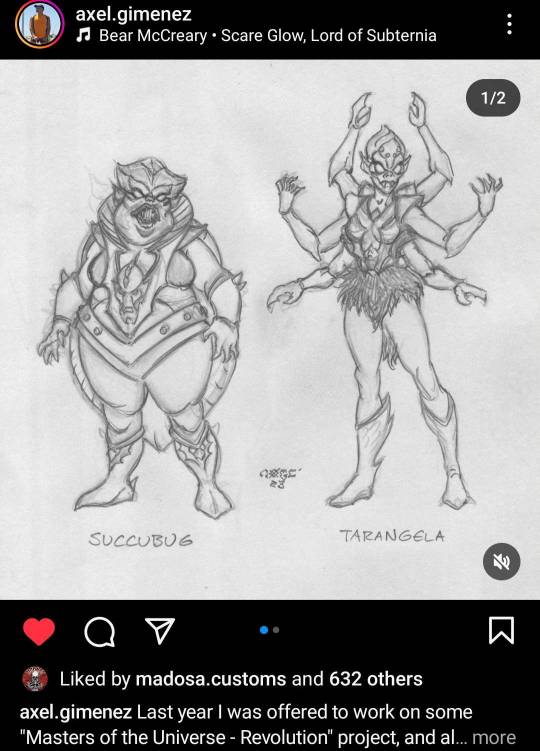
They are a cool new addition to the Horde team, and I am very happy to see the original Horde members around too.


We are in Anwat Gar... the Island which was already mentioned by the 200x show as a site with great technology, as well as in the Revelation prequel comics, showing us is the site where the Gar lived in this continuity.
The Horde is attacking the place for an unknown reason, and at some point is mentioned that magic is actually forbidden in that place, contrary to what is seem during Randor's rule in the present.
Meanwhile, where is Hordak?
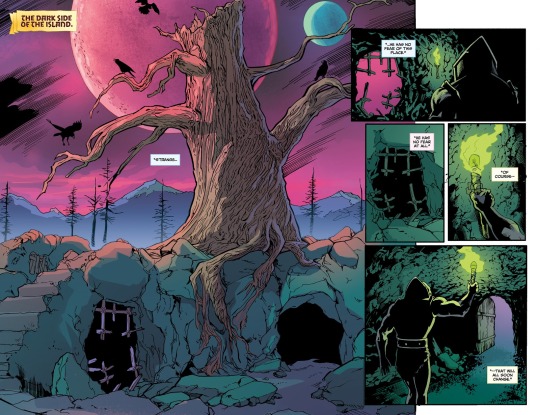
You see it right??! for old MOTU fans, this is the Fright Zone playset!
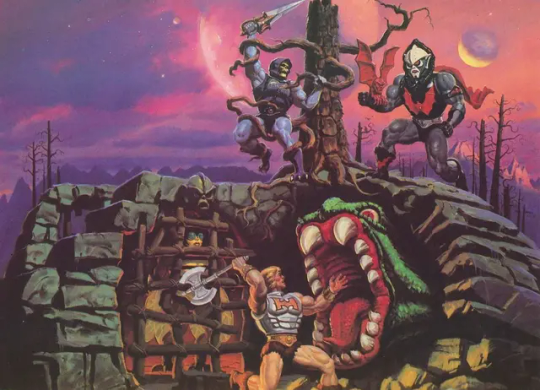
Apparently, Hordak has used the attack as a type of distraction to get to this place, he is looking for answers, and only magical entities can give it to him:
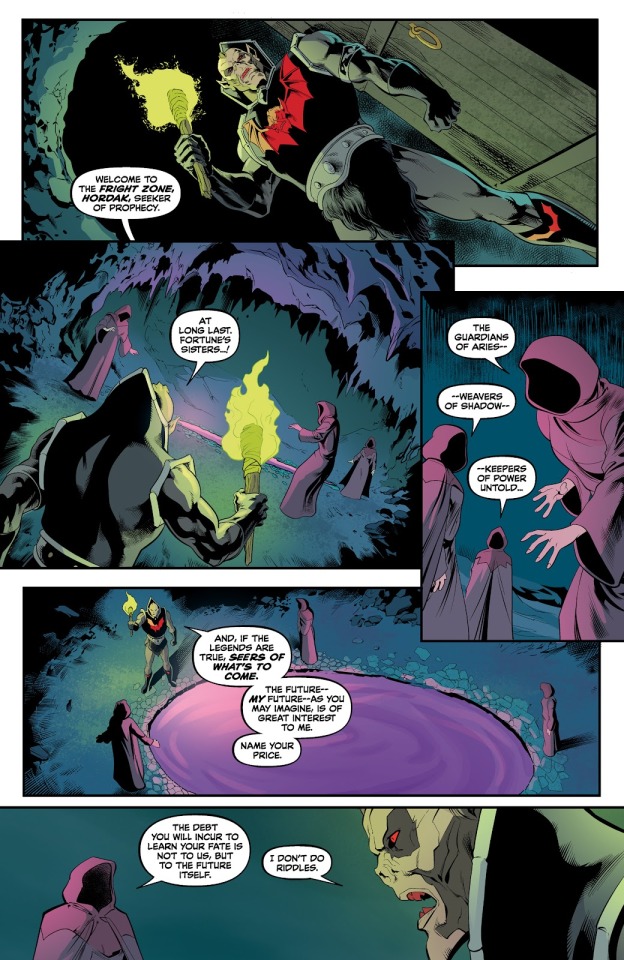
I want to take a moment to appreciate the call back to She-Ra's classic comics because these Fortune Sisters are a tribute to the 'Enchanted Sisters' who canonically ended up tricking Hordak in the classic comics:

Also, some dialogue of the scene:

Who the hell is Gaull?!
Soooo I had to go back to the He-Man character encyclopedia, remembering that Hordak's father was caller "Seferus-kur" also known as Horde Supreme, killed by Horde Prime (Anillis Kur) and Hordak (Hec-tor Kur), this info is ONLY in the MOTU 2008 bios and also to the 200x continuity (that is the story they wanted to use for the comics), so I guess they have choosen to retcon Hordak's origin story and also add a name for his father, because contrary to DC's interpretation, Prime is Hordak's older brother here:

Note to add, Revolution's continuity choose to go by a technological background for Hordak rather than magic, making the Horde a highly technological empire which despises magic.
More dialogue, Hordak's prompting to Eternia's ChatGPT


Man... the future will kick you in the ass.
Also, FINALLY the introduction to our second important protagonist in this issue...


Keldor's backstory is very similar to his 200x one, the only difference is that in this continuity he knows who his mother is, as if he had been raised by her rather than with Miro's. In fact, he was pushed to go and live with her by his father in the end. And surprise, she is a magic user, which was already pointed out as something forbidden in Anwat Gar, but Keldor doesn't care and uses his magic to attack the Horde invaders.
Saryn (Keldor's mother in 200x, here we don't have a name yet but I guess they will go with her original one) is the first magic teacher of Keldor, and she taught him for most of his young life, together with the magic history of Eternia, so we can already imagine who was narrating the story of Eternia's deities in the begining:
She taught him two things 1) we are made to defy and surpass our teachers 2) Keldor is destined to exceed Miro (Randor's and Keldor's father) at all cost and become a champion.
As well, she maintains a kind of telepathic connection with Keldor, where she constantly tells him he is destined to be a champion. But if she communicates with Keldor this way, where is she? apparently in some type of expedition:


Meanwhile Hordak has become frustrated by the Fortune Sister, who are trying to follow his indications, but going around the destiny of... someone else, who will accompany him through a parallel path:


"Grayskull's heir, yet unborn, will ground the ascendat bat, and in the fierce and final battle, Des-"
Screams internally... Hordak shut up and let the magic women speak.


Interesting thing, there seems to be a disagreement between some of the Fortune Sisters here, I wonder why?

*snorts* I really love this panel so much, Hordak is just so arrogant he thinks he would get it right away... man what if this was charged by some type of magic that would have killed you in an instant?!
Now we get to Anwat Gar again, where Keldor is trying to reach his mother while battling the Horde, meanwhile the citizens are more concerned about a magic user saving them than the whole Horde army around destroying the city, so we can say they have their priorities.
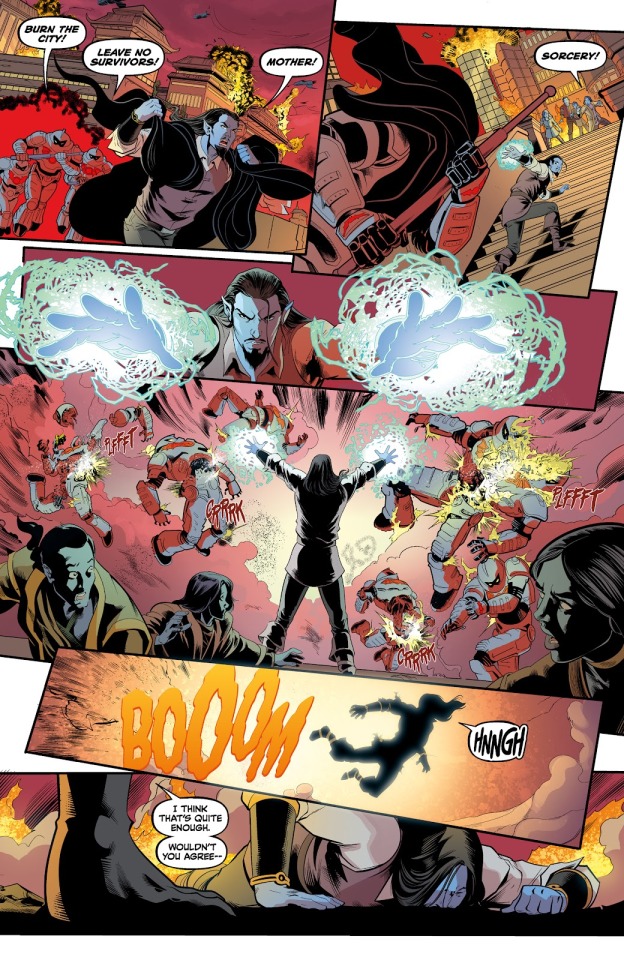
Finally Hordak arrives, helping a wounded Keldor and telling him it was all a distraction, as well Hordak tells him some interesting things:

"My name is Hordak, Supreme commander of the Horde fleet, Next in line to the Emperor's throne" hmmm...
Is important to highlight, is not Hordak who convinced Keldor to join the Horde, but his mother:

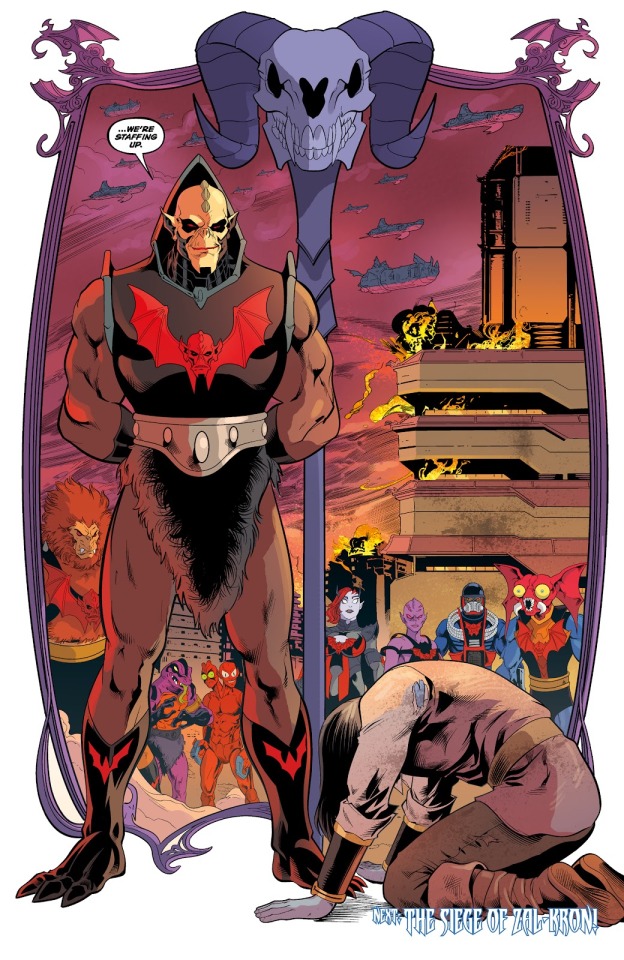
Finally, Keldor is recruited by Hordak to join the Horde, telling him they had uncovered a great power, and manipulating him (quite easily) to search for his rightful destiny.
Some things I liked about this issue:
The illustrations and art are ways better than most MOTU comics I've seem, even DC comics gets short in quality.
I liked the subtle call backs to the classic comics, the use of new characters, especially with the copyright issue, I believe the Fortune Sisters are going to reemplace Shadow Weaver, and the new Hordewomen are here to stay. We can see they cared for this story, especially with how much Lore they are trying to inplement here, blending most of the past continuities to create a new logic.
I liked that the Horde is a technological empire, just like the classic Filmation shows, and Hordak clrearly is the same arrogant and proud commander, still I can see he is more cunning and intelligent here, not the buffoon he was in the 80s, he is a good blend between his past continuities, including 2018. There is ambition in what he says, but his arrogance takes the worst of him.
If I have to point out what disappointed me the most... I do believe Keldor's introduction. He seems to be too young maybe, still focused in his mother's teaching and being seem as a rightful heir by Miro, his father. He is easily manipulated both by his mother (we don't know if she is good or bad yet) and by Hordak. he is desesperate to have his destiny and legacy.
I don't trust the Fortune sisters, or the only one of them who presented Hordak's with the Ha'vok staff, is evident she is going to be an antagonist in the future, and maybe she is Keldor's mother trying to led his son into a path for power using Hordak, which could be Keldor's undoing.
Thanks to @pennamesmith @lemaistrechat and @kuurankaiho for talking with me about this issue, is always good when there are more MOTU material to explore XD
#hordak#motu revolution#masters of the universe revolution#keldor#skeletor#masters of the universe#motur#motu rev#motu revelation#motu comics#dark horse comics#horde#evil horde#eternia#he-man#heman#he man motu#he man skeletor#he man keldor#revolution comics#mytext#mypost#motu meta
33 notes
·
View notes
Text
The similarities between Jonathan Sims and Adora is insane. Like I’m not talking bout personality but their roles in the story.
Sorry if none of this makes sense! Haha, I’m dying inside slowly.
(Spoilers ahead for She-ra and The Magnus Archives)
1. They’re introduced to a new place/environment where trying to do good eventually ends badly for them
- Adora becomes She-Ra and starts training with Light Hope, unknowing that she’s being groomed to help with the Heart of Etheria
- Jon becoming the archivist and trying to organize it (do his job), eventually leading to becoming the Archivist/Archives
2. Them trynna do good ends up undoing the work of their successor
- Adora starts training with Light Hope and ends up accidentally sending Etheria out of Despondos (which Mara put them in to keep them safe)
- Jon cleaning up and organizing the archives, thus contributing to The Eye (which Gertrude had messed it up to give the Eye a disadvantage)
3. Someone who seems somewhat significant to the “good” side ends up being a villain
- Light Hope turning out to be a villain, trying to turn Etheria + She-ra into a weapon
- Elias Bouchard turning out to be a villain, trying to turn Jon into the Archivist/a weapon
4. On that note. Elias Bouchard is Light Hope.
- originally good (we don’t actually know much bout Elias before Jonah except that he was a stoner) but then something changes and they get turned “evil” —> Elias getting possessed, Light Hope getting reprogrammed
5. Jon and Adora try their best to go against what they’ve been groomed for AND FAIL
- Adora tried her best to fight against the portal that Entrapta made, fight against being turned into a weapon, fight to keep Etheria in Despondos (fails)
- Jon fights to keep his humanity, to not be another pawn in Jonah’s game, and to keep the world from becoming the fear factory (fails)
6. That one friend who was originally a good friend of the mc but something happens and they start hating the mc instead
- Glimmer after she becomes queen and starts taking bad influence and being manipulated and does some bad shit (not really hating Adora, but definitely holding a bad grudge and fear of losing her power and disappointing her mom)
- Tim after they discover Sasha was replaced and also that Jon is slowly becoming a monster and is bout ready to kill him and hates him
7. The unbeatable villain ends up becoming just a pawn compared to what’s behind them
- Hordak versus Horde Prime
- Jonah Magnus/all the other avatars versus The Fears
8. THE ENDING.
- I know that Adora gets a happy ending or whatever BUT. The position where Catra’s holding her in her arms and everything is falling apart around them and Adora is almost too far gone and THEY KISS BTW. AHEM AHEM AHEM (sound familiar)
Anyways. It’s actually almost midnight rn and my phone’s bout to die and I’m slowly going insane while continuing my second (?) day of binge watching She-ra
#the magnus archives#tma#tma spoilers#Jonathan sims#she ra and the princesses of power#she ra adora#she ra spoilers#THE SIMILARITIES#THEIR CHARACTERS ARE NOT REALLY ALIKE. BUT THE ROLES THEY PLAY.#YOU GET IT??
21 notes
·
View notes
Text
i'm sorry but i just gotta rant a bit about relating to catra - but tbh, not just her..
i know i've been sleepy on the rants lately - i realized tumblr let's you freely make and post gifs (only 10 at a time tho, how's my obsessive ass supposed to live w that? i'm tryin) out of short vids and omfg, believe me, i ain't done w that. never. but i'm sorry if i duped you into thinking i was done posting any rants muahahahs cause i ain't done w them either.. ever. likewise. gifs are great cause a pics worth a 1000 words right, and they're 3 seconds of frames of pics. but sometimes, it feels like silent film. and i just can't always stfu
sooooo ~~
oooook, tbh, i haven't personally gotten much of any bs from people on this platform tryna hate on catra, but it's still happened to me elsewhere, and i know it still happens to some here, and i have thoughts about it. so, while i recognize that most the people i interact w on here prob feel mostly the same way - i'ma post about it just so it's on my blog. just so it's out there for those who can't and/or won't try to understand.
as many do, i relate to catra for personal reasons that run pretty deep - from my first watch, it's what made me empathize w her character at her worst and still hold onto the hope that she'd somehow claw her way out of the fucking pit she straight up dug for herself.
found herself down there and figured shit - that's it. this was my doing, this is my life now, till it becomes my death; this is where i've trapped myself; i dug my own grave and there's just no getting out of it ("you made your choice, now live with it" ~ reminds me of the fairly common proverb of "you made your bed, now lie in it")
but her chance to do this bold, brave, selfless - yet, ironically, still quite fittingly (for the catra we all know and love) self-destructive act (but this time, embracing self-destruction as a means of self-sacrifice - in an attempt to keep the promise for what she thought would be her last chance to ever do so) - of helping get glimmer to darla without adora ever having to actually dock at horde prime's flagship -
...break my heart, why don't you? into a number of pieces i can't fathom; like, if i gathered them all into a pile, i could start counting the shattered lil shards and wouldn't be able to count out the last one in my lifetime. break my heart like that. that's not a joke. this show makes me feel something, lots of things, in ways that, tbh, i have a hard time finding much of irl anymore. no fault of life's, ofc. much like catra, i know this shit is all on me.
but hey hey hey tho - that's ok. i'm ok. i don't mind that, because it's ok not to feel ok. tbh, sometimes i think people need to let themselves feel that more when they need to; just look at catra in s1-4. it's not an uncommon motif in fiction; every villain has an origin story. and emotions almost always play into it; and a villain's typical determination to repress the very emotions that plunged them into a previously unknown depth of darkness - only ever adds to their unpredictable, chaotic, and vengeful nature. who woulda thought~
that being said - my main point is, for anyone who just can't help but hate catra (and luckily, that doesn't seem to be anyone who typically sees my posts/interacts w me, so this is really just something i kinda feel the need to say, even if i'm preaching to the choir and know, deep down, if it actually met a catra-anti's eyes - it would prob only spark more irritation on their part, or at the very least, make no difference) -
but just know (i mean this sincerely) if you just can't see any reason to - not even empathize, i can see how that could def be something not everyone can manage - but if a person can't even see catra's character as someone they can try to sympathize with… and i mean, it doesn't have to happen in the first 4 seasons, but if the show ended and one happens to still find themselves unable to understand at all or even find her worth trying to understand in the slightest ~~
this is not sarcastic, i really swear i mean this: it seems like you might be pretty lucky.
truly and sincerely, i mean that; if you're someone who can't find any way in themselves to relate or even sympathize w this character, i'd guess it's at least due in part to the fact that you're quite literally incapable of seeing where she's coming from - at all. and idk. in some ways, i envy you. in others, i don't. it's confusing.
i've had remarkably good luck myself, it would seem, (idk how often other people get troubled by catradora antis here) endlessly ranting on this platform w/o anyone tryna give me a hard time - i've been able to share shit about not just catra & adora, but almost every other character - cause although i may not relate to any of them in quite the same way, they all represent (in my mind) different facets of personalities, interests, and insecurities as well. and i think many fans prob feel they share some aspects of themselves with certain parts of, often, more than one character.
and even the brightest characters have at least a small streak of darkness - even if it's as innocent as feeling like they don't fit in (glimmer, frosta, and scorpia have all shared this feeling- one to the other- at some point) or finding it so difficult to be in tune w their environment / circumstances that they're unable to connect w and use their powers; like perfuma in the crimson waste or adora on beast island.
i think there are a lot of just jaw-dropping, wonderful characters in spop - and def not for their powers, abilities, or accomplishments - but for the flaws they possess that viewers can relate to while they watch these characters simultaneously display their strengths and own those flaws - refusing to let them be what defines them. such a dope fucking msg if you ask me; everyone is flawed, everyone fucks up; but at the end of the day, everyone has their strengths, too; and if you're trying your best to use them for good - even if you falter at times.. what more could anyone ask of you?
i relate to catra all throughout the show (and i realize many do, and while i feel for whatever in anyone's past/present has caused them to see a kindred spirit in catra, i'm sure we can probably all agree: it is so lovely to know there is this fictional cartoon character [of all things] that was rebooted in a way that [imo] was very much intended to offer some solace, hope, & understanding to those who do find her relatable)
cause guess what. you're worth more than what you can give to other people.
that goes for everyone.
or at least, it certainly should. we all deserve love. ok?
you too. <3
#spop#catradora#spop catra#spop adora#spop rant#oh absolutely killed it w the length of this rant#prob not a record on word count knowing my past#but it's been a lil bit since i went off like this#so proud of you if you read the whole thing#i wish i had like- idk. a fun sticker for you or something#here - pls accept this cyber hug as a ty
11 notes
·
View notes
Text
Bow's Character Arc
There was a discussion on Twitter from people who were confused about Bow’s character arc and whether he had one (he very much does, and it’s actually one of the clearest / most spelled out in the entire show!). To help anyone experiencing that confusion and because it’s never a bad idea to understand how character arcs work if you want to be a writer/storyteller, I might as well break Bow’s character arc down for anyone who might find it helpful.
Buckle in, it's nerd time!

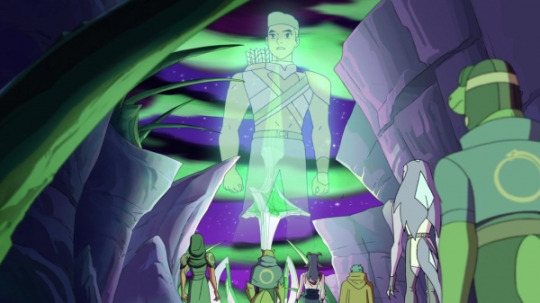
At the most basic, a character arc is a change (usually growth) a character goes through over the course of a story. Usually good (positive change arc) but sometimes bad (negative change arc). It’s very often a reversal aka the character is often in the exact opposite state by the end of the story than how they start it out. It can be trickier to follow in an ensemble story like SPOP because there are a lot of characters with parallel story lines going on and multiple arcs colliding in different ways, but She-Ra does a really good job of giving each of the four leads arcs (with Catradora as the main leads, Glimbow as the secondary) near equal time.
Yes, including Bow.
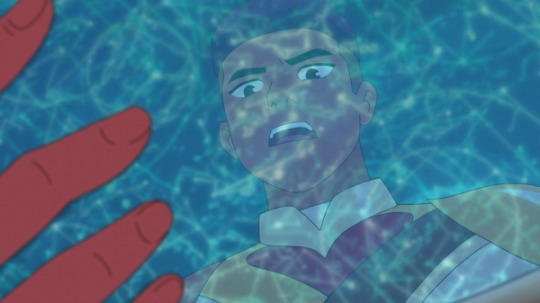
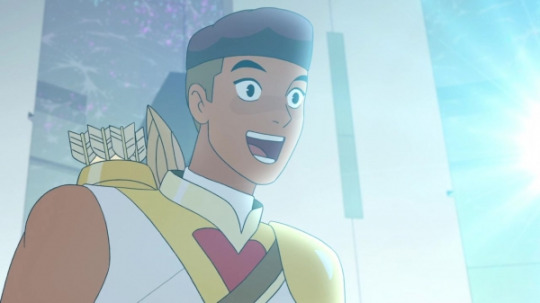
What I think throws people about Bow’s arc is it’s based on hypocrisy.
Meaning…
He encourages his friends to talk it out and share their feelings… while hiding his own feelings from his dads and repressing his frustrations with having to be the middle man between Adora and Glimmer (Season 4)
He declares that average people (such as the kitchen staff at Dryl) don’t need the princesses and are just as capable of fighting the Horde themselves… while he believes himself and his abilities inferior to Princess Entrapta’s
He reminds the others (esp Adora) about the need to accept help… while refusing any help for himself (think about “Don't worry about me. I'm the one who worries about you. Can we go back to that? Please?” in Pulse through to that moment when he agrees to let Glimmer take him to check on his dads in Return to the Fright Zone and literally leans on her)
I think a funny way to sum up his character issue is: Not me, though.


This arc progresses across all five season as he gradually changes. He starts the series out repressing his feelings from both his family and friends while doubting his abilities and refusing to ask for help (he IS Adora’s mirror, after all!). Over the course of the series he learns to express his feelings instead of bottling them up (The Beacon > Reunion > really all of Season 4 but it comes to head starting with Boys Night Out through Beast Island > Stranded), gains more confidence in his tech skills (The Frozen Forest > Signals > Flutterina > Mer-Mysteries > Corridors), and starts to learn to ask for help (The Beacon > Pulse > Return to the Fright Zone).

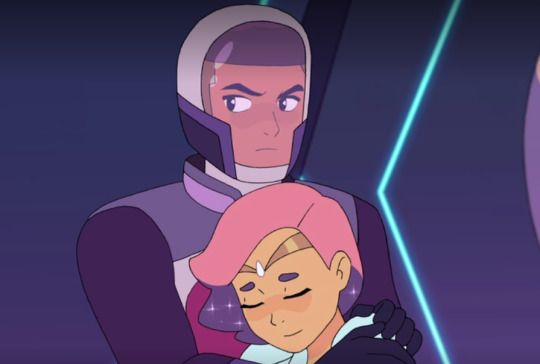
Which of course all culminates in The Heart Parts 1 and 2 where he finally wraps up all threads at once by
a) asking Scorpia to trust him (putting faith in someone else to help)
b) completing Entrapta’s program to unchip everyone (proving he IS as good a scientist as she is)
c) giving the speech to everyone on Etheria rousing the common people to fight Prime (average people can make a difference… which he now fully believes that includes him).
And while you can make the argument that confessing to Glimmer is part of his arc to share his feelings, the fact is that he completes a full character arc without ever behind reduced to just someone’s love interest because none of his character growth is tied to his romantic relationship at all (which was what the original tweet claimed). It's all his inner journey to have faith in himself and his abilities and how they relate to his friends and loved ones.
And thus the guy who starts the series as “only one around here who’s not a princess” with doubt in his tech abilities ends the series as confident Tech Master and future King of the regular people he sought to inspire, which is about as textbook a reversal as you can get.
Does it come out of nowhere?
His character arc progresses and takes significant focus in the following episodes….
S1:E6 System Failure
S1:E10 The Beacon
S2:E1 The Frozen Forest
S2:E3 Signals
S2:E7 Reunion
S4:E3 Flutterina
S4:E4 Pulse
S4:E7 Mer-Mysteries
S4:E8 Boys Night Out
S4:E10 Fractures
S4:E11 Beast Island
S5:E3 Corridors
S5:E4 Stranded
S5:E9 An Ill Wind
S5:E10 Return to the Fright Zone
S5:E12 Heart Part 1
S5:E13 Heart Part 2
That’s 17 episodes out of 52 which means his character development gets approximately 32% of the focus of the entire show… which for an ensemble cast like this where he’s one of four leads is just about dead on as it's over a quarter of the episodes.
That's a significant chunk of screentime with multiple episodes devoted specifically to his character journey.
Is his journey as flashy and action sequence-y as what Adora, Catra and Glimmer get? No, but it's a) a show marketed to girls so it makes sense they get the more cinematic scenes and b) his arc is more emotional and thus didn't need to hinge on big action like theirs did. Though considering the culmination of his arc is him as a 100 foot tall hologram speaking to the entire planet, I personally feel like that was pretty hard to miss.
If you look at all of this and still want to say that Bow did nothing or had no character arc, I think the thing to ask yourself is: why is it so important to you to discount the accomplishments and character growth of this character specifically?
In conclusion, this is the face Bow makes when he spent five season growing, changing and kicking butt as Tech Master and Voice of Reason and you say he did "literally nothing"...
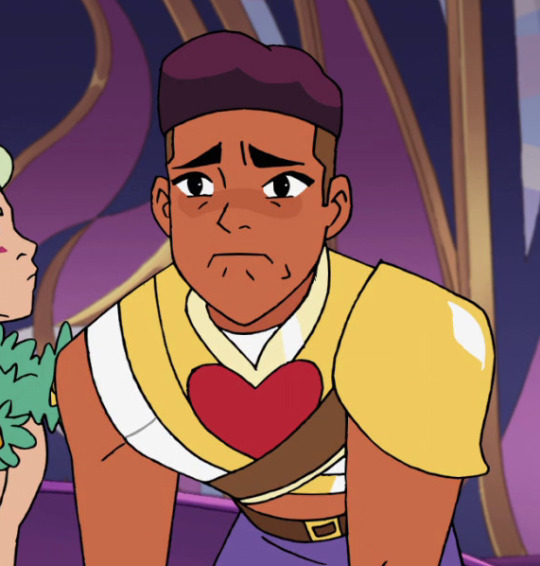
#spop#shera#she ra#bow#meta#literary analysis#if I had more free time I would do a whole series analyzing the writing in this show#because it's so well done#spop bow#glimmer#adora#entrapta#tippen's posts#you all forget I'm a writing nerd until I bust out the craft talk don't cha?#i would like the record to show that I put the picture sets side by side#to show the start and end of each part of his arc#but tumblr ignored that layout
390 notes
·
View notes
Text
Sheep in Wolf’s Clothing
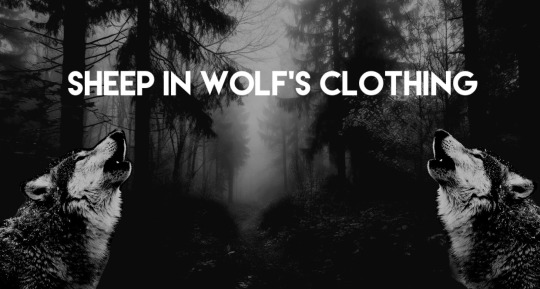
Chapter One
Series Masterlist -> Here
Pairing: Yandere! Uhtred x reader
Summary: After hearing of a Lord in need of help, Uhtred and his allies investigate.
Warning: None for this chapter
Note: This series is inspired by the S3 E1 of The Last kingdom. Only if the witch Uhtred takes captive is innocent.

A simple job. That’s what it was supposed to be.
Word had spread from taverns in towns up and down Northumbria, the current territory Uhtred and his men found themselves in. Word passed from Patron to barmaid, barmaid to townsfolk, townsfolk to Uhtred and his allies.
The travelling Lord had attracted quite the audience at the latest town they’d come across. He’d been welcomed and housed, clothed and bathed, fed and watered. Watered with the finest ale the towns little tavern had to offer.
The size of the tavern lead to the horde of curious townsfolk to be crammed in tightly to one another. Elbows to elbows they sat. Words of one man being heard by many.
The close proximity of the masses had Uhtred lending his ear to a raving drunkard. A man who drank his ale between loud shouts of a troubled Lord far north, who was desperately in need of help. Despite the clumsy nature of his swigs, he continued to tell his tale as he drank. Spinning the story that this lord was overrun with Danes desperate to take his holdings. They worked closely with a supposed sorceress who had been cursing the Lord and his men. Rumours spread that she had killed the current lords father through a curse. The lord now desperate to end the wicked sorceress had appealed for help. For the task of ridding the Lord of the Danes and witch they worked with, he would reward handsomely.
After quiet whispers between the four and a back alley chat with the teller of the tale, the group left for Upper Northumbria. The place where Lord Ironwood resided with his apparent hefty fortune.

The lord that the met was younger than Uhtred and some years older than Osferth. He made no kind introduction. He was direct about his task and clear about the price.
Despite his harsh nature he did provide for them with prime meats and mead to be shared inside his fort. Uhtred and his men were permitted to light a fire that they sat around to eat.
The fort itself was well thought out. It has large walls with guards walking across. At each corner a watchtower of sorts was built. Inside the Fort there were the very basic of buildings. A stable for the few horses they had, a small square that acted as a meeting point, a town hall and a barracks. A final building off to the side of the town hall they’d come to learn was Lord Ironwoods own residence.
The simplicity of the facilities was far from the problem. It was the run down nature of the buildings and sense of unease that surrounded them. Stone bricks of the wall were weathered and beaten, as if attacked through years of war and rain. Some of the wood on the buildings showed signs of Charing and had blackened because of it. The few horses they did have were in poor health and looked unkept. It felt as if the Fort had been attacked ten times over with the damage seen in every place. It seemed as if their Dane problem was vastly understated. It was clear now that more was going on than they originally thought.
Everything they’d seen lead them to the same thoughts, where was the gold? Surely if this Lord Ironwood had such funds he would spend them wisely. So they he didn’t have to live in such squalor.
When Uhtred brought these thoughts to the Lord in question he directed them to a hidden set of stairs behind the town hall. Stairs covered by bushes and protected by a wooden hatch. A wooden hatch protected with a thick metal padlock. The only key was wrapped on twine around the Lord’s throat.
The stairs lead them to a small room filled with chests. After opening one of the chests they saw an array of coins and trinkets and jewellery. The golden currency accepted universally by the group.
Even with the promise of payment, thoughts of unease still plagued Lord Uhtred’s mind. Why with such wealth was the job not done? Surely he had enough resources to rid himself of the Danes.
Uhtred wasn’t alone in his thoughts. Finan, Sihtric and Osferth sat around the fire, chewing on fresh game while mulling over the task at hand.
“While I’m with you on some details being a bit blurry Lord Uhtred, the man provides a good meal and good gold for killing a few Danes. Something you’ve often done for free.” Finan reasons while tearing into a leg of rabbit.
“It’s details that are missing from the man’s story. Things that just don’t add up.” He tells the Irishman in reply. Drinking a tankard of ale in small enough sips.
“Listen Lord, sometimes details get muddled when telling stories. Once I heard of a woman with such huge breasts, yet when I slept with her-” The Irishman digresses. Ready to jump into a story of his past conquests. A pass time not out of the ordinary for the man.
“Finan,” the Dane starts, cutting off the Irishman. “This is more than that. I feel it in my gut. Something about this is wrong. Something about this Lord is wrong.”
“I’d say it’s the taste of good food for the first time in a while mate.” Finan jokes, raising a smile from the quiet monk and the bastard Dane also in their company.
“He pays more than most Lord. Stories are bound to have holes with the amount of men they’ve been through.” Sihtric adds causing Finan to laugh and producing a chortle from Osferth that he quickly covers.
Normally Uhtred would find humour in anything his company would say. The men joke as often as they drink. The two often simultaneous done. When not fighting their time was spent enjoying the spoils that came with his Lordship. Including his permanent home in Coocham, the barrels of ale they were given for free and the many, many women found willing at the taverns they frequented.
Even so he was no young man anymore. No war hungry Dane, desperate to make his mark on the land he’d called home for so long. He had a home, a place to rest after weeks of ridding aback a steed and sleeping in beds not his own. It was a luxury he couldn’t spoil through the desires greed presented.
“I am a lord and you my noble men,” the sentiment made Finan smirk. Feeling anything but noble sat in a crumbling town hall and drinking piss weak mead.
“We are no mercenaries.”
The weight the words held resonated with each man. True they were not mercenaries. Mercenaries didn’t have a permanent place to rest in Coocham. Mercenaries didn’t have a sense of comradeship like these four men had. Years spent together had proven their loyalty to one another and created tight bonds they valued more than any amount of gold. It wasn’t to be thrown away over some Lord.
The three men sat silently as they drank from their tankards. Ale pouring down their throats as they mulled over their Lord and more importantly friend’s words. Deciding whether Lord Ironwoods gold truly had any value to them now.

The next day the four travelled out into the surrounding area. After trotting down the small hill that the fort sat on, they reached a woodland. Dense woodland that surrounded the Fort on three sides. A disadvantage if any enemies were to to hide in and surround the fort. Thoughts of a siege passed through Uhtred’s mind. Thoughts that soured as he thought of the little food Lord Ironwood possessed. Land around his holding was unfit to grow a weed nevermind a yield of crops. From the meal they shared last night it became apparent that the woodland was heavily relied upon for small game or food or any kind.
“The hill gives us the advantage if it comes to a fight, but the surrounding Forrest is thick enough to hide a host of any size.” Sihtric voices, having thought the same as Uhtred at the scenery.
“Hill? I’ve seen mounds of dirt bigger that that thing. Just say what we’re all thinking, that if it comes to a fight the fort would hold no host back. A host of page boys and age old knights could storm that fort.” Finan proclaims.
“Ever the optimist, Finan the Agile.” Osferth quips, sarcasm thick in his quiet voice. It works to ease the tension among them but doesn’t remove the ever hanging unease present in the air. The fort would be futile to defend and the men can’t help but feel that their task is becoming less and less do able.
“Still we carry on. Ironwood told us they’d been attacking from the east. So we ride there, see if we can catch sight of these Danes and get an idea of their forces.” Uhtred commands.

They carry on in the direction of the Dane’s. Traveling through the never ending trees. Even when they think they’ve made it through they reach a clearing or open field, surrounded by more trees. It seems never ending.
At one point Uhtred stops the pack. A distant sound puts him on high alert. The joining of voices can be heard in the distance. From there they dismount their horses and walk on foot. Treading carefully through the Forrest undergrowth. Voice grow louder and music can be heard. A single harp cuts the voices as they quiet in union. Soft music fills the air, a contrast to the loud choir that preceded it. It lasts little before it comes to its final note and is swept up in the chorus once more. This time in a company with the beating of drums. Drums that almost shake the ground the men now walk on.
Keeping a few tree rows back they silently watch the scene before them. A vast settlement meets their eyes. It reminds Uhtred and Sihtric alike of their childhood homes. Both houses and building being mostly the same. It’s clear this is a Dane village, not only from the buildings but from the people that reside here.
In front of their hiding place in the Forrest a celebration of sorts takes place. In the middle of the social space a large fire roars on, filling the air with a smoke and the distinct burning wood smell. Around the fire the Dane’s dance carelessly, faces content and worries non. To the sides makeshift benches have been made from tree logs and boulders. The space is brimming with people. Some sharing a meal or mead, others talking joyously to one another. The celebration is exuding euphoria. A feeling that almost spreads to the men crouched amongst bushes.
The voices quiet once more as the single harp plays on. Between the sea of people a woman steps out amongst them. Wearing a white gown and no shoes, her hair wild and free. Her face bares lines of ash on her forehead and down the middle of her chin. Her voice carries across the fire above all the rest.
“Hear us Odin, hear our prayer,” she pulls a knife from her side and slits her hand across the palm.
“Grant us victory against our the Saxon scum so we may lay waste to their crumbling Fort and kill the Lord that sits there.” As she finishes she flicks her blood into the fire and the flames become viridescent.
The green flames dance higher in the air. Leaping up into the sky as more smoke rises with it. Consuming the logs at the base with greater vigour than before. It raises cheers from those around the fire and they start back up in song.
Voices join in one chorus:
Dance the emerald flames up high
Find our fallen in the sky
Hear our cry and hear our prayer
Death to Saxons everywhere
The chilling undertone does little to take from the merriment of the people singing. They all smile, dance and laugh as the flames slowly fade from emerald back to a burning orange.
Across the fire the girl walks around the dancers and the singers and the drinkers. She walks to a man sat off to the side on a makeshift throne. Made from the stump of a tree. Carved with runes and symbols familiar to most Danes.
The man is clearly Dane. His beard is long and his hair braided. His eyes are dark and his face stern. He spreads himself to take up the entirety of the throne. Looking unmoved by the jovial mood around him.
When the girl approaches him his eyes glance up. Taking in her toned form adorned in a white. A smile ghosts his face as he welcomes her on to his lap. Pulling her so she sits with her back to one of the arm rests.
She nestles into the man’s embrace, hiding herself away. While the Dane looks over her cut palm.
Without explanation Uhtred feels a tug at his heart. As if he’d lost a love, a love he’d not yet known. Strange as it was he couldn’t explain it. Explain why such a sight made him intrigued, made him curious about the girl. Why the nature of their embrace made him jealous, made him envious. Why the dress that clung to her skin filled him with a yearning, filled him with a desire for her.
For her body, for her soul, for her.
The feeling strange but the feeling right. Something about her drew him in. Fate was the only answer. It was clear now. This was fate.
This girl would be his.

#The last kingdom Poly#angelsworks post#dark#yandere uhtred#uhtred of bebbanburg x reader#uhtred x reader#uhtred the last kingdom#uhtred ragnarsson x reader
113 notes
·
View notes
Text

This is a very rough reference drawing I have made of the Wind and the Alchemist. (I forgot to scan the inks alone [facepalm])And it is still a work in progress, the colours are not even done x) (forgive me but watercolour takes TIME)
It is Origin Prime in my AU - the Oraman AU - in which He is a God - the Wind - Who made a Planet, and an Atmosphere, and quietly watched His People be born and evolve along centuries.
One day, His story will be told.
Now, given Physical Form by an Alchemist (last on his profession), the Wind will one day be known across the Known Universe, as Horde Prime.
I need to redraw them properly.
Here is a link to the beginning of His story - their story but lets be real, it is a Prime origin story:
Welcome, to the Second Scene
(Fic summary:)
Watching over His people, who had since long forgotten Him, was a lonesome, faceless, shapeless, and voiceless God.
On this now long forgotten Planet, the people had chosen Science and Technology, over the belief in God and Mythology.
Yet, one Alchemist - a science since called "magic" and discarded as children's tales - held the belief that the God and magic were real.
A hint of will and a lot of dreams, a danger from beyond the Stars - and the Alchemist could finally prove his fellow scientists that he was right. And he could finally provide the God with a physical form, and a shape, and a face. And the God was finally given back His long forgotten voice.
#Horde Prime#The Emperor of the Known Universe#Horde Prime origin story#Daffodil of the Storm 2021-2023#Will the Alchemist#Origin Spacebat Species#I do not know what other tags I can add to this#Fanart#Fanfiction#It has started
12 notes
·
View notes
Text
"Spock, Messiah!" review

This novel was written in 1976 by Theodore Cogswell and Charles Spano. The Enterprise crew is experimenting with some new brain implants, that are each attuned to one native of the planet Kyros, to acquire the same knowledge, personality and behaviour of the alien, and thus mingle better with them to study the Kyrosian culture. But everything backfires horribly when Spock gets the personality of a madman with messianic aspirations, and becomes the planet's tyrant.
The best thing of this book is that UK cover above, with fabulous Spock. Do not read this book under any circumstances. No, really, it's pretty bad, and Spock is barely in it. Though the novel has a few saving graces so I'll begin with those:
The Good: The story is entertaining enough, with a clever twist at the end. And even if the concept of having Spock as the villain or under some sort of mind control is nothing new, at least the Klingons aren't behind it for a change.
The culture of the Kyrosians is well developed and vividly described. As well as the intricacies of Federation's technology, if you're into that (I'm not, so I can't tell if the science is sound or not). Descriptions are too detailed for my taste, but your mileage may vary. Anyway, the action and danger keep things interesting.
Also Kirk is a history nerd.
The Bad: The authors don't seem to know or understand the characters. Scotty has red hair (?????). I guess because they wanted him to be as stereotypically Scottish as possible. Kirk refers to Spock as a living computer all the time, which is something that only McCoy would do, and only in jest. And in general, characters aren't... in-character.
The brain implant would have been a good idea to behave as a native and respect the Prime Directive, if the natives had at least been notified and agreed to it. As it is in the book, it's a flagrant violation of privacy. The Enterprise crewmembers are tapping into the aliens' emotions, memories and behaviours with no consent at all. Good job, Starfleet.
There's also some crap about Vulcans. Supposedly, Vulcans are biologically unable to feel emotions (no, they don't, it's just they're good at supressing them) and also have zero sexual urges outside pon farr (yeah, tell that to Amanda).
Which reminds me, the horniness level of this novel is absolutely off the charts. I don't think even the TMP novelization comes close. We have Kirk in the shower, feeling water massaging his "taut, muscular body". Though that's more or less in line for Kirk. But then we also have lurid descriptions of Spock having sex with a woman (non-consensual on Spock's side of course). A female ensign jumping naked to swim in a lake for absolutely no reason, or doing a full striptease before a horde of dangerous, hostile warriors. Chekov, naked from waist down, getting a hipo-spray in his ass right in the Transporter room, in front of everyone (okay, this was funny, but couldn't it wait for sickbay?). As well as the implication that Chekov got a cavity search from some guards. Yeah, I know the original show addressed sexual issues sometimes, but it was never this crass. This stuff is fine for adult fics, but here feels out of place.
All this would be somehow understandable if the writers had never seen Star Trek and were just doing a job. But it's obvious from references to other episodes that they've actually seen it. It's just they didn't understand shit.
The Awful: Almost every time Uhura or Sulu appear, they're referred to as "the black woman" or "the Oriental". Anyone who has seen five minutes of the series knows that Uhura is black and Sulu is asian, but reminding the reader of this fact all the time, kind of defeats the reason why Roddenberry wanted them on the bridge in the first place. Anyway, since Uhura and Sulu barely appear in the story, racism doesn't escalate beyond that. But then there's...
Ensign George. A female crewmember who is used to exemplify rampant sexism and misogyny galore. And since she's a regular character, there's plenty of opportunities for that. Every five pages or so, she loses her clothes, or is scantily clothed, or being harassed by leering men (including McCoy and Chekov). All of this, however, is fine since she's really slutty (actually not, she's being influenced by another person's mind). The writers run out of adjectives for her body: "sensous, voluptous, delicious". At one point, she literally says that it was "her fault" that Chekov got into a fight to protect her from a sexual assault (it would have been more noble for Chekov if he wasn't also harassing her two minutes earlier).
And how did Ensign George end up a regular in the story? She's interested in Spock, but as her real self is quite shy, she links herself to a seductive Kyrosian to get her abilities. Their personalities are too opposite though, so she loses control and ends up having sex with Spock. The incident leaves her ashamed and traumatized. What would the sensible thing to do? Remove her implant immediately and restore her to her normal self, right? Well, no. Let's leave it in her, so she can be used by Kirk and co. as sex object to bargain with the natives, should the need arise. The real Kirk would NEVER, you bastards!
Did I also mention that Kirk uses counterfeit money to reinstate a Kyrosian doctor in his clinic, after such doctor was expelled for drinking and abusing young women? Yeah...
If anyone thinks the original TOS was sexist, just compare notes with this novel. And remember, this book came ten years later. For my part, Cogswell & Spano can stick their writing up there where Chekov got the hypo-spray.
Spirk Meter: 1/10*. Kirk seems annoyed about women finding Spock attractive, and the one thing he can't believe is that Spock slept with one. Messiah Spock may be planning a war and conquest on a planet, that's possible, but this one thing has to be "an hallucination, as impossible as Spock flying". Kirk also sighs his name the first time their eyes meet, after being turned into the Messiah. However, most of the time, Spock is treated just as an enemy to defeat, and Kirk even coldly suggests killing him if necessary.
On the other hand, one has to wonder what's going on between Kirk and McCoy. The doctor is described as Kirk's only friend aboard (everyone hates Spock in this book), and the only one around whom Kirk can be emotional. The two of them spend a lot of time drinking alone in Kirk's quarters. The doctor enters uninvited while Kirk sleeps and wakes him with coffee. And he seemingly stays there while Kirk strips to enter the shower.
There's also a little bit, about McCoy being afraid of showing his "true feelings" for Spock.
*A 10 in this scale is the most obvious spirk moments in TOS. Think of the back massage, "You make me believe in miracles", or "Amok Time" for example.
52 notes
·
View notes
Note
I wanted to know how you made this series? I've been thinking about making my own type of abridged series except for The Owl House. I was just curious how you do it. Do you have any tips?
The series at first was very much "the exact script with more swear words", and it's just gotten very out of hand! But I have had so much fun writing this, it's the best. Here's a few tips that come to mind...
Know the source material inside out: I think this one is a given, but knowing a lot about what your parodying is so important and means you can make a lot of in-universe jokes.
Be impartial: In fandoms, the disagreements over shipping and characters can be pretty heated at times. Take the piss out of everyone equally.
Have standards: Know what lines you will and won't cross and stick to it
Work with the original but tell your own story: This one's a bit trickier, but just re-telling the original exactly can get a bit boring. Find something subtle and centre it for your own story. I often say that I "make the subtext into just text", and that's kind of how it is with the Horde Prime storyline. SPOP isn't about a bunch of queer people fighting a space homophobe, but it isn't not about that.
Make the time: It's actually quite intensive to do this, so I wouldn't recommend doing three posts a day seven days a week. But equally 'when I get a chance' and sporadic posting is a surefire way to forget about it.
Don't force jokes: This goes for comedy in general, but the best jokes are ones that fit into the flow of the conversation, take a moment to get, and aren't telegraphed. You're not writing for a live studio audience, so it doesn't need to be rapid-fire punchlines.
That's about all I can advise, really. I don't know what I'm doing, I've just been doing it for quite a while now!
67 notes
·
View notes
Text
Spooky season fairytales (6)
And we reach the penultimate post of this series! After looking at actual fairytale adaptations (well... roughly), for this post I want to love at fantasy movies that are not any adaptation of any specific tale or story... But which were made with the intentions of having a "fairytale feel" or a fairytale lore. Dark or creepy movies inspired by fairytales as a whole. Basically "dark fairytale fantasy".
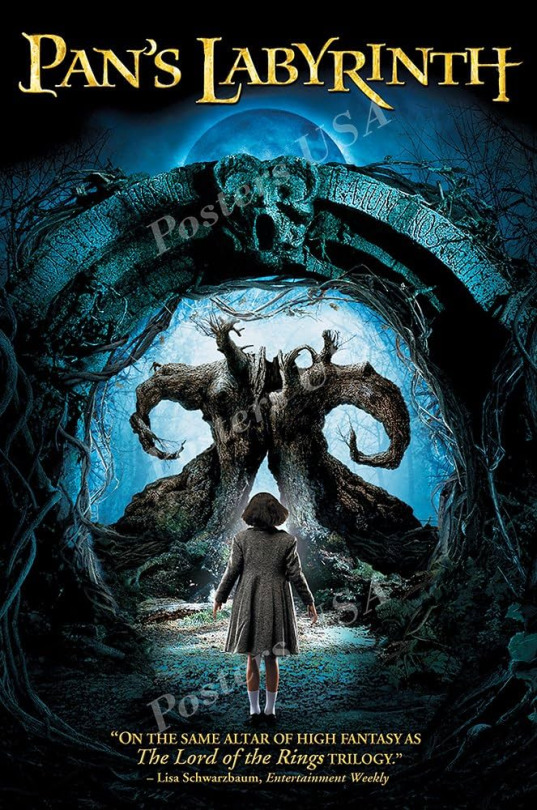
And of course I have to begin with the most FAMOUS dark fairytale movie of our century... Guillermo del Toro's "Pan's Labyrinth", in the original Spanish, "El Laberinto del Fauno".
Do I need to present this movie? Probably not, since it was one of del Toro's masterpices, but to simply put it... This is a dark, haunting, poetic but tragic movie following a little girl's life in the Spain of Franco. Said little girl meets in the ruins of an old labyrinth, guided by fairies, a faun, who reveals to her she is the lost princess of a fairy realm... But to regain her place, she will have to undergo fairytale-trials. All while the little girl enjoys her "changeling fantasy", we follow the harsh and horrifying everyday life of World War II Spain that unfolds around her: the girl's step-father is a Falangist captain who hunts down with cruelty the resistance in the area, while her mother is having a very complicated pregnancy. And as the real-world piles on the horrors - famine, execution, torture - so does the fairy-world becomes darker and darker, filled with monsters, ogres and blood...
Of course, Guillermo del Toro did other dark "fairy pieces" - such as Hellboy II, which is a dark and gritty urban-fantasy homage to the fair folk - and recently returned to the fairytale world with his acclaimed Pinocchio.

1985's Legend, by Ridley Scott, is usually considered as one of the "great 80s fantasy movies", alongside pieces such as Ladyhawke, The Dark Crystal, Conan the Barbarian, Willow and more. However "Legend" is also, and this is less evoked, one of the prime examples of a movie belonging to the genre of "fairytale fantasy" - alongside stories such as Stardust or The Neverending Story.
After all, all the elements are there. The main hero is a brave young "wild man" of the woods, who must save a princess trapped by an evil monster, with the help of fairies and elves, and the whole quest goes through numerous folkloric motifs and characters - the unicorn, the water-hag, the fight of day and night, the endless winter... But speaking of "endless winter", the reason why this movie is featuring here is because of how dark it becomes. Truly. The main villain is even the literal embodiment of Darkness, an evil creature sporting the most iconic look of a devil in the history of cinema, and played by none other than Tim Curry himself. He sends hordes of goblins devour babies and kill unicorns throughout endless winter and ever-ending night... To reach him one must cross a monster-infected swamps leading to a dark palace of venomous charms, dancing statues and cannibal feasts... And even the elves and fairy sidekicks are truer to Brian Froud illustrations and the original "fair folk", being whimsical, capricious, easily angered and just as dangerous as the villains they're fighting...
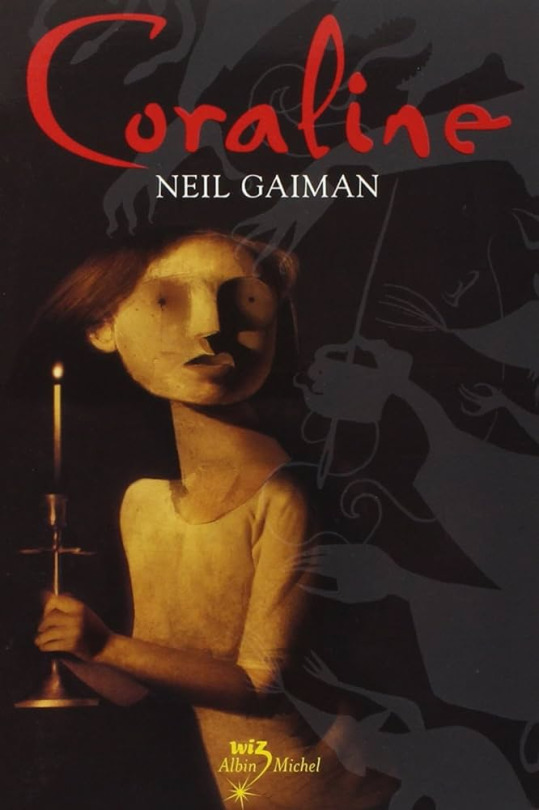
Coraline. Another great piece of "fairytale fantasy".
Coraline (the movie or the book it is based on, the two have several differences but complement each other very well) is the story of a young girl living your typical "travel to another magical world" plot, as she discovers a secret door allowing her to escape her dreary, boring and unpleasant life to find an alternate, whimsical, fantastical and charming version of her own family and neighbors. But of course, this being a Neil Gaiman story, things quickly grow strange and eerie, as talking cats, fairy-ghosts, shapeshifting witches and buttons sewn in place of eyes come to turn the dream into a nightmare, and then into a battle of wits to survive against a dark and old magic...
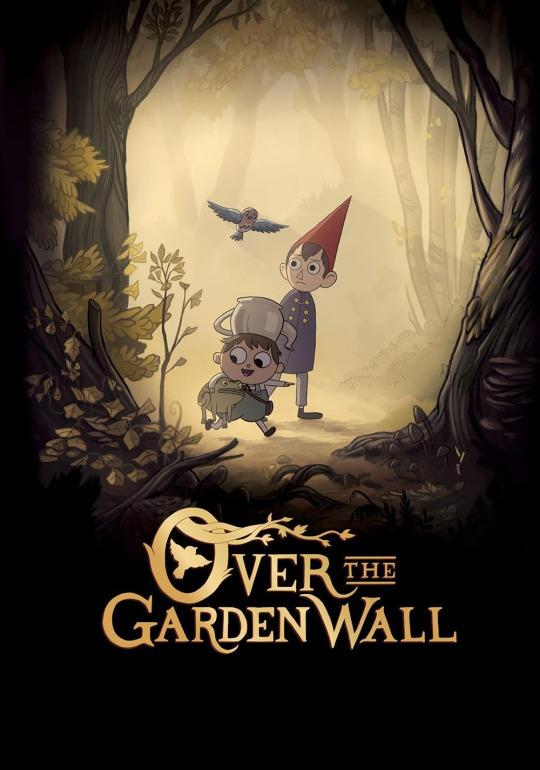
Yet another VERY famous piece - there's a lot of famous pieces I am covering here, but hey, not my fault the good stuff is getting the recognition it deserves!
Over the Garden Wall, an animated mini-series that was created by the same man behind "Adventure Time", telling the story of two brothers as they try to find a way home while venturing into a bizarre and magical forest called "The Unknown". They are guided by a talking bird in hope of finding a good witch who will help them - all the while mysterious and dark figures such as the Woodsman or the Beast linger in the shadows and keep crossing path with them...
Over the Garden Wall is a perfect autumn watch, since it actually takes place during the autumn season, the first episodes exploring an Halloweenesque harvest festival, while the lasts take place in winter. More than just autumn imagery, the show relies heavily on the "vintage" and "old" imagery of early 20th, 19th and even 18th centuries America, building its wonders and magic with vintage Halloween cards, Colonial or Industrial-era fashions, Betty Boop or Silly Symphonies cartoons, the Dogville Comedies and the "Game of Frog Pond" board game... However, under its at first whimsical and fanciful appearance, the mini-series quickly reveal a haunting tale worthy of the darkest fairytales, exploring themes such as betrayal, despair, death and sacrifices.
In fact, "Over the Garden Wall" was inspired by numerous fairytales, hence its fairytale feel. Many, many people commented that, upon watching the series, they felt the exact same thing they experienced when, as a kid, they discovered new fairytales - I also felt it, and this proves the power of this series that truly captures the essence of what a fairytale is. On top of reusing fairytale tropes (two children exploring woods filled with girls turned into birds, good and bad witches, strange talking beasts...) and explicitely referencing some "fairytale-like" children novels (especially "The Wizad of Oz"), the very artstyle of the show was inspired by "fairytale art", ranging from Gustave Doré's illustrations of Perrault to Tenniel's Alice in Wonderland drawings, passing by old Andersen illustrations.

Ah, finally a more obscure piece! At last for non-French people... La Cité des Enfants Perdus, The City of Lost Children. A 1995 movie by Jean-Pierre Jeunet. Now, Jeunet is one of those French moviemakers distinctively recognizeable thanks to his very unique style of movie making. You will recognize this when you know that he is behind the movies "Delicatessen" (the one about a former clown in a post-war world behind hired in a building dominated by a cannibalistic butcher) and the "Amélie Poulain" movie (about a quirky Parisian waitress who decides to change whimsically the life of those around her). Jeunet enjoys the bizarre, the unusual, strange technologies, extravagant characters, dark humor, absurd comedy, and oniric or fairytale-like atmosphere... And this all blooms in the darkest and eeriest way in this movie.
To put the story simply (which is a challenge since it is a complex movie)... Off the shores of a shadowy, dirty, corrupt fishing town, in a manor in the middle of the sea (on top of an abandoned oil rig), an old mad scientist regularly captures children. For you see the scientist is unable to dream, and tries to steal away the dreams of children - which never works, since being captured by a creepy old man makes the children have nightmares rather than sweet dreams. One day, the little brother of a simple-minded circus strongman is captured - and the strongman teams up with a little girl, a street-savy member of a group of street urchins, to try to get him back. The story is further muddled by the presence of a cult of "cyclops" in town that do the dirty work of the mad scientit for him, the threat of greedy conjoined sisters that run the gang the little girl is part of, and the strange entourage of the mad scientist himself (six identical brothers acting like children, a dwarf-wife, and a sentient, talking brain in a jar).
This movie truly feels like a dream - like one of those dark, strange dreams that never fully go into a nightmare while still walking at the edge, and the story, no matter how feverish it can get, still keeps certain cohesive elements to maintain its flow of sinister wonders (such as the theme of family, heavily explored). The movie never goes into actual magic - we are more into a proto-steampunk world crossed with the mad science of Gothic literature and horror movies - but its oniric, bizarre and borderline surreal treatment of the subject did earn this movie the classification of "science-fantasy" and "dark fantasy", as mythological, folkloric and fantasy archetypes can be clearly seen throughout the science-fiction setting (the "cyclops" for example, or the very idea of "a creepy old man stealing children's dreams").
Heck - this movie was one of the prime inspirations behind "Little Nightmares"!

And finally, I cheat a little here, but I had to include it: Disney's Hocus Pocus. This is a classic of Halloween movies, a fun but dark horror-comedy for teens, (well rather like a full comedy but with elements that make it horrific here and there), campy in all the good ways, and with the greatest trio of witches ever depicted on stage since Shakespeare's Weird Sisters.
Now, the movie itself is not very much fairytale like. It is a Halloween comedy, an urban-fantasy story for teenagers, drawing upon the myth of the witch and the legends surrounding witchcraft. However, precisely because the movie explores the figure of the witch, there are several fairytale references here and there. While the Sanderson sisters were mostly build out of the Christian myth of the witch (using human-skin bound grimoires, having sold their souls to the devil, tied to black cats, summoning ghouls out of graves, hate salt...), there are also several parts of their characters tied to fairytale witches. Hansel and Gretel is the most obvious one - they are child-eating witches living into the woods who lure children to their home before "devouring" them (in souls if not body) - but Snow-White is also among the references (a very vain witch who is obsessed with staying the fairest/youngest and kills children to do so?). And of course, there's all the fairytale-witches tropes ranging from "turning people into animals" (here a cat rather than a frog) to the use of the number three.
Oh yes, and let's not forget the specific use of an oven...
#spooky season fairytales#spooky season#dark fairytales#fairytale movies#over the garden wall#pan's labyrinth#legend#hocus pocus#the city of lost children#coraline#fairytale fantasy
26 notes
·
View notes
Text
Lore: The elves, masters of seas and magic
Among the many mortal species of this world, the elves have always been the wheel around which the rest turn. Or so they would like to believe. They elves are and have been many thing, heirs of true magic, prime servants of the dragons, scourge of the central continent... scattered, divided, broken.
The origins: The first age of the elves is shrouded in mystery even to the oldest remnants of their kind, whether through ignorance or hubris few records were made of their true origins. What remains, distorted, biased or entirely undecipherable, leaves place only to speculation or superstition.
Some believe the first elves were scions of the fae world, conquerors from beyond the veil who entered the material plane to seize it from undeserving mortals. In truth, it would be more likely that the elves were weak fae, too close to mortality for the realms of the fae and therefore rejected for their weakness were exiled into this plane. Or that the first elves were mortals touched by the powers of the fae, or taken by them and warped into beings half-mortal and half-fae. Regardless of lowly or lofty origins, the elves are a pale shadow of this supposed original glory, while innate sorcerers they possess nary a trickle of the font of power of a true fae.
But if there is any truth to the old stories, the first elves were the stuff of legend. Gods in their own right. Tales speak of kin born attuned to the elements, treading the world light as a feather, blades carving empires from nothing, wielders of the primal flame, dancers within the winds, favored of the lands and seas. Wherever this almighty elven empire is now, what we know of it is a sad and withered parody.
Dragon Worship: In the ancient times of draconic dominion over the world, the elves were the first among the mortal races that bent to them. Worshiped them even, for the dragons were as gods to them, incarnations of the true flame of chaos, the raw might of the elements, older even than the elves.
But when the end of dragons came, the Dracomachia, the elves stood powerless as fellow mortals, even some of their own, betrayed the dragons and took to them with sword and sorcery, with vile technology brought about to shatter their wings and pierce their hearts. "Tyrants" the dragonslayers called them, "monsters", "slavers", few other mortal races shared the elven love of dragons.
And when the dragonslayers' dark deeds were done, the old hunters gorged on the blood of the old dragons were rejected in turn by other mortals, driven away for their cruelty and never-ending thirst for more of the primeval power of dragon blood, slaughtering even the most benign or youthful dragon and leaving their broken and drained bodies in their wake. In a way that none but them could bear to watch. The last dragons were allowed to flee beyond the ocean, to reach more peaceful lands of their own.
But the fall of the dragonslayers brought no comfort to the elves who remained loyal and saw their wise masters dethroned and broken before them. Nourishing a lasting and venomous flame of hatred against the mortals who betrayed them.
Dominion: Their kind did at several points come close to dominating the West, during the Age of Sorcery they swept across the world, tide of blades and flames, stopped only as they crashed into the hordes of the orks and the sorcerer-kings of mankind. Their chance at absolute control swept from below them as the sorcerer-kings were slain by the champions of mankind, and the age of sorcery left in the dust for the Age of Might.
The end of rule through sorcery was replaced by the Sword Rule of the True Kings, and so were the elves pushed back to their islands
Reckoning: The long lived elves feed their grudges for millenia, generation after generation inspired by the outrage of their ancestors at the mortal betrayal of their draconic masters, the arrogance of other mortals who denied the elves rightful rule of the world, who denied their power and wisdom, their knowledge far superior to any of the primitive, disgusting lesser races that kept pushing them away.
"No more." so spoke the Bearer of the Eternal Flame, he who drove his brethren to one final war against the lesser races, this time not for domination, but for extermination. They carved a trail of ash and blood across the coasts and drove their swords deep into the hearts of the realm of men, but through alliance of men and orks were once again broken and humbled, their mighty god-king shattered upon the knee of the Warlord Gor Sur'ataruk, shaman leader of the Eastern Horde.
Blame fell on all but the leaders of the suicidal invasion, as all those who opposed the war were branded as traitors and exiled into the wild deep woods of the western shores, making up the first wild elves in history.
Yet time erodes all, the genocidal leaders of the War of Reckoning were soon replaced by wiser rulers, recognizing that any chance at elven dominion had long since passed them by.
Irrelevance: With the fall into irrelevance of the most xenophobic parties of elven politics came a new regime, no more kings, no more sole rulers driving their kin to insane wars. The Republic was born, the Senate of the elves made great strides towards mending relationships with the realms of men and orks, but the rift seemed impossible to cross... yet.
Elves had all the time in the world and they were ready to accept a momentary setback, if they could not triumph through might, they would exploit other, more insidious means.
----------------------------------------------------------------------
And that's all for now, I think that's enough to digest right now. I'll make a new poll for the next one when I'm ready, hope you enjoyed my little expose!
15 notes
·
View notes